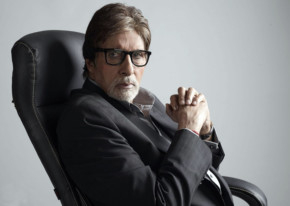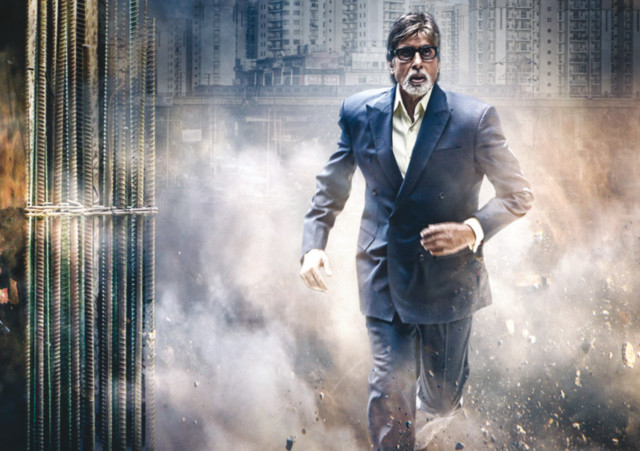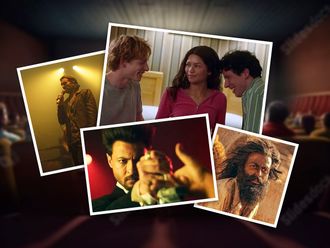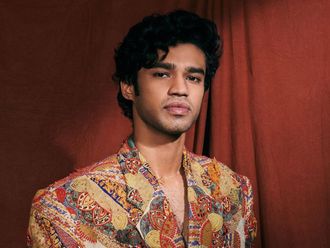
He has acted in over 175 films and won glorious accolades, but it was his television stint that saved Amitabh Bachchan from bankruptcy. In 2000, the long-enduring matinee idol was heavily in debt after the failure of his business empire, Amitabh Bachchan Corporation Ltd,, but his decision to host his first-ever reality game show Kaun Banega Crorepati — India’s version of Who Wants to be a Millionaire? — eventually pulled him out of the financial mess. It was a creative gamble that paid off, as Bachchan would later admit in his blog, because his friends and well-wishers had dissuaded him from making that move.
Now. after 14 years since his TV debut, the 71-year-old star is back in your living rooms with another TV project: Yudh, a serial that premieres in the UAE on Monday. Kaun Banega Crorepati is also returning soon with a new season.
“I play Yudhishtir, a successful businessman in the construction business. He is plagued with a life-threatening ailment, has business rivals who are out to destroy him and his family life is filled with issues,” said Bachchan in an e-mail interview.
Co-produced by his production company Saraswati Creations with Endemol India, Yudh has talents such as Anurag Kashyap on board as its creative director, Shoojit Sircar as creative consultant and Ribhu Dasgupta as its director.
The actor opens up about his latest project and what he thinks of the television’s place in the entertainment business. Just don’t call him a legend.
Q: Tell us about Yudh and what attracted you to it?
A: Yudh is a finite TV serial, a story and concept put together by a very efficient team of writers and creative directors, along with a fine selection of talent. TV serials are something that I had not attempted, and when an opportunity came, I readily accepted it.
Q: How would you describe your role in Yudh and what were the challenges you faced?
A: I play Yudhishtir, a successful businessman in the construction business. He is plagued with a life-threatening ailment, has business rivals who are out to destroy him and his family life is filled with issues. Yudh chronicles the way in which he battles through it all. It is multi-layered and was most interesting for me to play. Challenges are a given for every role that you portray in this business. It was no different here as well. Each moment is filled with apprehension and a fear whether what we do is correct or not.
Q: Is it true you did your own stunts against your doctor’s advice?
A: There seems to be some misinformation on this topic. I have done no stunts in the serial and have certainly not gone against any doctor’s advice. That is wrong reportage. The rig that you mention is a camera rig that is used by hand-held cameramen. In one shot, it was required for me to wear the rig and load it with the camera, and perform a particular scene in order to get a different way of shooting a sequence. That is all. Yes, the rig and the camera on top of it is cumbersome and painful when you have been strapped up to it, but it was fine.
Q: Do you think opting for a fictional show is a serious gamble?
A: That is something we shall ascertain on release of the show. I have been gambling with creativity for the past 45 years.
Q: After working for several decades in the movie business, what are the differences between acting in a fictional TV show and a film?
A: I did not find too many differences. Just like in films, a TV serial project is also accompanied by a script, a character, a story, a camera and an actor driven by the inputs given to him by his director to perform. I encountered all of this while working on Yudh and it’s no different from a film shoot.
Q: There was a time when television was considered the poorer cousin of Bollywood films — some even considered it a step down for actors. Do you subscribe to it or not and why?
A: Yes, many in the industry and perhaps in the outside world have expressed similar opinions. But I have not found it so. Working on television is equally, if not more exacting. Perhaps you may also like to know that television in India is creating a turnover, commercially, that is three times that of cinema. So, who is the poor cousin?
Q: Did names like Anurag Kashyap and Shoojit Sircar propel you to support Yudh?
A: Both these gentlemen are distinguished in their profession. It was a joint decision by Endemol and myself that we ask Anurag [Basu] to be creative director, and later we took the help of Shoojit Sircar as a consultant creative director, which he most graciously agreed. It was our decision to get them on board, and we are grateful to them to have considered favourably to our request. Once Anurag agreed to our proposal, it was left to him to set up a team, which apart form several others included Ribhu Dasgupta, who has directed the serial.
Q: Does Amitabh Bachchan, the legendary actor, ever need to prepare for a role or have you reached a point in your career that you can nail a role with your eyes closed?
A: Cut out the ‘legendary’ epithet. I am no such. I am just another actor. And actors do not go about their job with their eyes shut. We spend a great amount of time, energy and sweat to portray what we have been asked to. Eyes shut? No… never, not for us. It would be the most terrible day in my life if I were to reach a stage where such an allegation were to be thrown at me.
Q: KBC is one of the long-enduring hits on the game-show front. It relied on your powerful personality but what does Yudh bank on?
A: You are wrong. KBC has nothing to do with my presence, or my very limited personality. KBC runs on the concept of providing an opportunity to excel. Its designers were those that worked on it scientifically and psychologically to bring it to perfection. It is a show that runs successfully in more than 80 countries in the world, and they do not have me as their anchor. Yudh hopefully intends to creatively bring about a difference in the way we put across a TV serial on Indian television, both in its story content and presentation. It has renowned names that have constructed and visualised it.
Q: Do you think television serials have the power to reach more people — especially women? What’s your take on serials that are regressive in its theme and condone violence against them?
A: In a country such as ours, with over a billion population, it is conservatively assumed that at any given time, more than 300 million are watching television. That is a huge number by any standard, universally. We have close to 800 channels up and running in India, and applications for more waiting to be green lighted. That’s like the entire TV channels of the world put together operating in one country. Can you counter the reach it has? Women are an integral and equal portion of our society, and our TV audience. I have not heard of any regressive serials being aired which condone violence against women. That would never be accepted. Not just by our people but also from a very efficient Censor Board. Our creativity and story-telling has always demonstrated that good is victorious over evil, and that in the end, poetic justice shall prevail.
Q: Does ‘Jack of all trades, master of none’ apply to actors or is experimenting a way of life for an actor?
A: In cinema in India, the first part of the adage you quote ’Jack of all trades...’ is an essential. You have to be a singer, actor, dancer filled with dramatic emotional and comedic talent. Whether we master it or not is the judgement left to the viewer. Yes, experimentation is welcome and many do, much to their credit!
Q: After seeing the trials for Yudh, what were your impressions on it?
A: I have always found it very difficult to assess my own work. I would rather leave it to the audience. If they like it, we shall be happy. If not, we shall try again.













